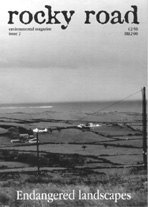All is well for the climate of our bluegreen planet. Climate change has finally become the environmental issue of the year, and the Big Oil boys are all investing in renewable energy. All except one. The villain of the year is Esso, according to Greenpeace.
The Greenpeace StopEsso campaign is attracting considerable media attention. During StopEsso Day last December, 300 Esso garages were picketed and boycotted throughout England. A French court ruling has ordered Greenpeace to stop using a parody of the Esso logo in its StopEsso campaign in July.
The StopEsso website explains "what makes Esso worse than the rest". High on the list of the corporationís environmental crimes is its insistence on refusing to invest in renewable energy.
But if in 2002 Esso tops the list of Big Oil villains, it hasnít always been so. This dubious honor used to belong to Shell.
When Greenpeace put its might to a global anti-Shell campaign in 1995, the company was forced to pour millions into public relations and restructuring. Shell was castigated for its plans to sink its obsolete oil-storage platform, Brent Spar, in the Atlantic ocean, and for its dismal environmental and human rights records on Ogoni land in Nigeria.
An unexpected consequence of the campaign was that Shellís competitor Chevron was awarded contracts that Shell lost. As Naomi Klein wrote in her anti-corporate book No Logo, such effects are a serious limitation of brand-based militancy. "When one logo gets all the attention, even when it is being used tactically to illustrate broader issues, others are unquestionably let off the hook," she wrote.
Seven years on, Greenpeace has turned its unwelcome attentions to Esso, and has apparently let Shell off the hook. Esso "refuses to invest in any renewable energy projects, in contrast to BP and Shell, who will each have invested $500m over the next three years," reads the StopEsso website.
 Greenpeace campaigning against Big Oil has evolved from fighting local destructiveness of oil exploration in 1995 to combating global climate change in 2002. This influential environmental groupís media campaigns continue to be one of the powerful forces, or "changed market conditions" in corporate-speak, to which corporations competing for global market shares must adapt.
Greenpeace campaigning against Big Oil has evolved from fighting local destructiveness of oil exploration in 1995 to combating global climate change in 2002. This influential environmental groupís media campaigns continue to be one of the powerful forces, or "changed market conditions" in corporate-speak, to which corporations competing for global market shares must adapt.
Meanwhile, in response to damning scientific evidence, increased frequency of extreme weather events, and mounting public pressure, political will has turned renewables, particularly wind energy, into a highly profitable venture for multinational corporations. Profits are fueled, depending on the country, by a combination of fixed prices per kWh (often upgraded for wind energy), tax credits, some tax exemptions, renewable energy credits, and subsidies which make the proposals increasingly attractive to financiers in deregulated energy markets. A cheap way to buy a green image for corporations that are still responsible for more than their fair share of environmental damage and human rights abuse!
The wind industry and its many apologists in the environmental movement are however quick to point out that direct and indirect subsidies for fossil fuel and the nuclear industry still dwarf those available to the wind industry.
While this may be factually correct, it implies that companies who invest in wind energy do so for the love of our planet. Naomi Klein would probably laugh at such hypocrisy, and claim that the only thing that has ever motivated Big Business is the search for ever increasing profits.
But can this assertion be quantified? In our case, do subsidies for the wind industry, combined with the publicís shifting support for "green" companies, compensate for the fact that in our current economic system it is still more profitable to exploit fossil fuels and externalize the costs? Or, in other words, is it a newly-found woolly green feeling or just cynical market sense that is making the likes of Shell jump on the windpower bandwagon?
When in doubt, listen to the shareholders. So what do the shareholders say? They demand change. A broad coalition of ExxonMobil (aka Esso) investors won more votes than ever before last May for a resolution asking the corporation to adopt a renewable resource plan.
 "Mainstream investors are questioning whether ExxonMobil is really protecting shareholder value with its isolated position on renewable energy and global warming," asked the coalition. Shareholders know best: it is now in the financial interest of the company to give the appearance of bowing to StopEsso, and start investing in wind energy like its competitors.
"Mainstream investors are questioning whether ExxonMobil is really protecting shareholder value with its isolated position on renewable energy and global warming," asked the coalition. Shareholders know best: it is now in the financial interest of the company to give the appearance of bowing to StopEsso, and start investing in wind energy like its competitors.
One must wonder though why Greenpeace is not tempted to add Enron to its list of the good guys. After all, didnít the energy giant buy Tacke, the second German wind turbine manufacturer, and Zond Systems, the first American manufacturer, in 1997? Unfortunately Enron collapsed just before it was set to manufacture the turbines for the worldís largest windfarm, off the coast of County Wicklow in Ireland.
What a pity. The vision of Greenpeace and Enronís CEOs shaking hands against a backdrop of turbines gently rotating in the Irish breeze would have made a wonderful PR opportunity.
- – Anne Ruimy



 "Mainstream investors are questioning whether ExxonMobil is really protecting shareholder value with its isolated position on renewable energy and global warming," asked the coalition. Shareholders know best: it is now in the financial interest of the company to give the appearance of bowing to StopEsso, and start investing in wind energy like its competitors.
"Mainstream investors are questioning whether ExxonMobil is really protecting shareholder value with its isolated position on renewable energy and global warming," asked the coalition. Shareholders know best: it is now in the financial interest of the company to give the appearance of bowing to StopEsso, and start investing in wind energy like its competitors.
